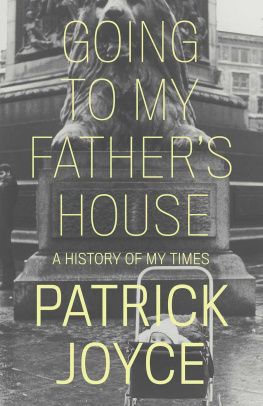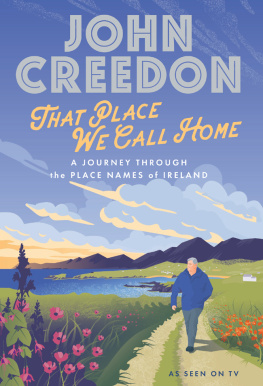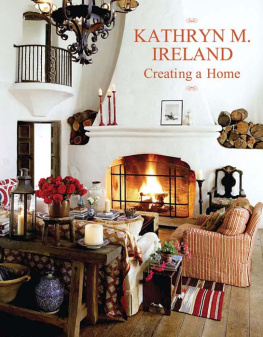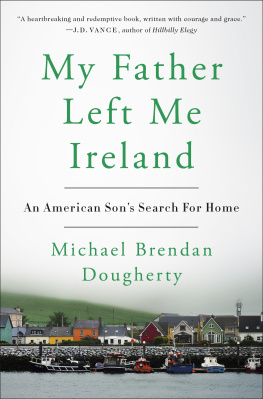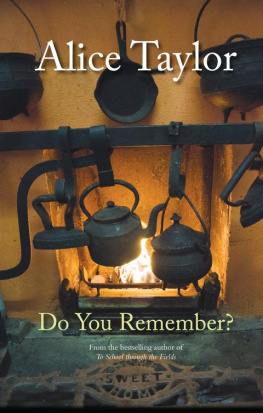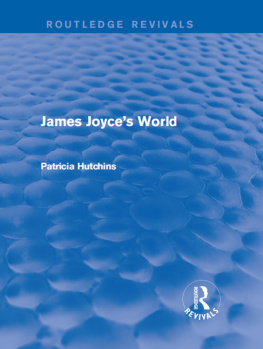Contents

Going to My Fathers House
Going to My Fathers House
A History of My Times
Patrick Joyce

For the immigrants and those who come after them, and with deepest love for my grandchildren, Isaac and Jonathan Joyce, and Orlagh Joyce-Young.
First published by Verso 2021
Patrick Joyce 2021
All rights reserved
The moral rights of the author have been asserted
1 3 5 7 9 10 8 6 4 2
Verso
UK: 6 Meard Street, London W1F 0EG
US: 20 Jay Street, Suite 1010, Brooklyn, NY 11201
versobooks.com
Verso is the imprint of New Left Books
ISBN-13: 978-1-83976-324-3
ISBN-13: 978-1-83976-326-7 (US EBK)
ISBN-13: 978-1-83976-325-0 (UK EBK)
British Library Cataloguing in Publication Data
A catalogue record for this book is available from the British Library
Library of Congress Cataloging-in-Publication Data
Names: Joyce, Patrick, 1945 author.
Title: Going to my fathers house : a history of my times / Patrick Joyce.
Description: London ; New York : Verso Books, 2021. | Includes bibliographical references and index. | Summary: A historians personal journey through immigration, home, and the questions of nationhood Provided by publisher.
Identifiers: LCCN 2021012068 (print) | LCCN 2021012069 (ebook) | ISBN 9781839763243 (hardback) | ISBN 9781839763267 (ebk)
Subjects: LCSH: Joyce, Patrick, 1945 | HistoriansEngland, NorthernBiography. | Joyce family. |
IrishEnglandLondonBiography. |
ImmigrantsEnglandLondonSocial conditions20th century. | Connemara (Ireland)Biography. | Wexford (Ireland : County)Biography. | EnglandBiography.
Classification: LCC D15.J69 A3 2021 (print) | LCC D15.J69 (ebook) | DDC 941.085092 [B]dc23
LC record available at https://lccn.loc.gov/2021012068
LC ebook record available at https://lccn.loc.gov/2021012069
Typeset in Minion Pro by MJ&N Gavan, Truro, Cornwall
Printed and bound by CPI Group (UK) Ltd, Croydon CR0 4YY
Contents
Decades later that childs grandchilds
speech stumbles over lost
syllables of an old order.
John Montague, A Severed Head,
from The Rough Field
I am always going to my fathers house, I am always going home.
Novalis
This book began as a history of my parents, written for my children. It was in this regard personal but also universal, for in my act of writing I joined hands with how most of humanity apprehends the past, namely through the family that has gone and is to come. The time that is most presently and intimately the past, and the hoped for future, is the time of the family. It is as if the family is the door which is the one most open to us, the one from which the light of the past shines brightest.
As in many such acts of remembrance, my aim was to take the existence of my parents out of the historical obscurity from which they came, for they were poor and without a voice. They were immigrants from an Ireland that now seems centuries not decades ago. What I began to write was a bequest to the future, so that their lives were not forgotten and would be part of possible futures, if only those of my grandchildren. I thought that my posterity in this time of great change might even, in the relatively short period between my writing and their reading, be already too far hurled into the future to make sense of their own lives without knowing more of the worlds from which they came.
What I wrote I also considered to be something of a homage to my parents; I can find no better word. Homage because of the debt I owe them, which was the life they made for my brother and me in London, and the Irishness they gave us. That dual debt of gratitude, for that which was made in the new place and that which was carried from the old one, is one that immigrant children from everywhere always have. So, in discharging this debt I found that I was also telling a bigger story: one of the emigrant, the immigrant, and their children. Homage involves the show of public respect, and as I wrote I realized I wanted to mark their lives more widely than my family alone, and so the historical details started to accrue. I am by occupation and preoccupation a historian, so that the banking up of historical details is second nature to me.
As I wrote, then, what I set down became a book, and one in which its author figured more and more. A historian needs evidence, and short of a few letters though many photographic snaps there was little to record the memory of my parents. Therefore I become, in some way, one of the few remaining documents that mark their time on earth. Their memory depended on my memory, and I realized that I was part of their story too, of what they passed on into history.
And so these pages, A history of my times (if I may be permitted so grand a term), tell something of my life. However, the book is neither a memoir nor a history, but is located somewhere between the two. Being, as I find myself, between the two or in an Irish phrase, idir eatarthu, of and between two things at the same time my hope is that I can see both better. I could not find many precedents for what I was doing, so I just did it, in a sense being led by the writing, by the pleasure of it, by where the words led me as they came out from some unknown place within. Unknown, but I have always tried to prime that place, make it ready, by knowing at least some of the history I guessed might be waiting there.
For me, then, being between history and memory means embedding my own memories in historical writing, as a way of making them speak with greater purpose and direction than they might otherwise have done. Alone they are limited to a single life, and in this case the mundane one of a scholar, for whom much of life is sedentary and lived in the head. However, if I embed memory in history, being between the two also means doing the reverse, embedding history in memory, so that in my attempt to write a history of my times, it is memory itself that is forever prompting the history, taking it off in different directions, along jagged, uneven paths, into subjects and times that history writing does not usually attend to; into the silences of time that might be better listened to this way. Memory mine or that of any person is, of course, more than an individual matter, so this collective memory is my subject too, in war and peace both.
A history of my times has a different sense, too. What time is and where our times come from are central concerns in what follows: my times extend back over more than my life alone and that of my parents. We live in several times, not just one, and the past is constantly at work in our lives, forever becoming the present and so shaping the future. Nonetheless, I have lived a certain span of years, those between 1945 and now, when I write this; inevitably, I talk about my generation, before we all fade away. So I am not interested in writing a memoir, in which the I is the composer busily arranging the score of her or his life. I do not want, I am not interested in, revealing an inner life, though it is true that one cannot altogether avoid the inner in recounting the outer, as the reader will find.
My way forward has much in common with that of Czeslaw Milosz in his Native Realm, first published in 1959, though our books are very different in many other respects, and he is a man of my fathers generation, only a year separating them. The introduction to his book, which he subtitles a search for self-definition, concludes with words whose simple eloquence I borrow now:

